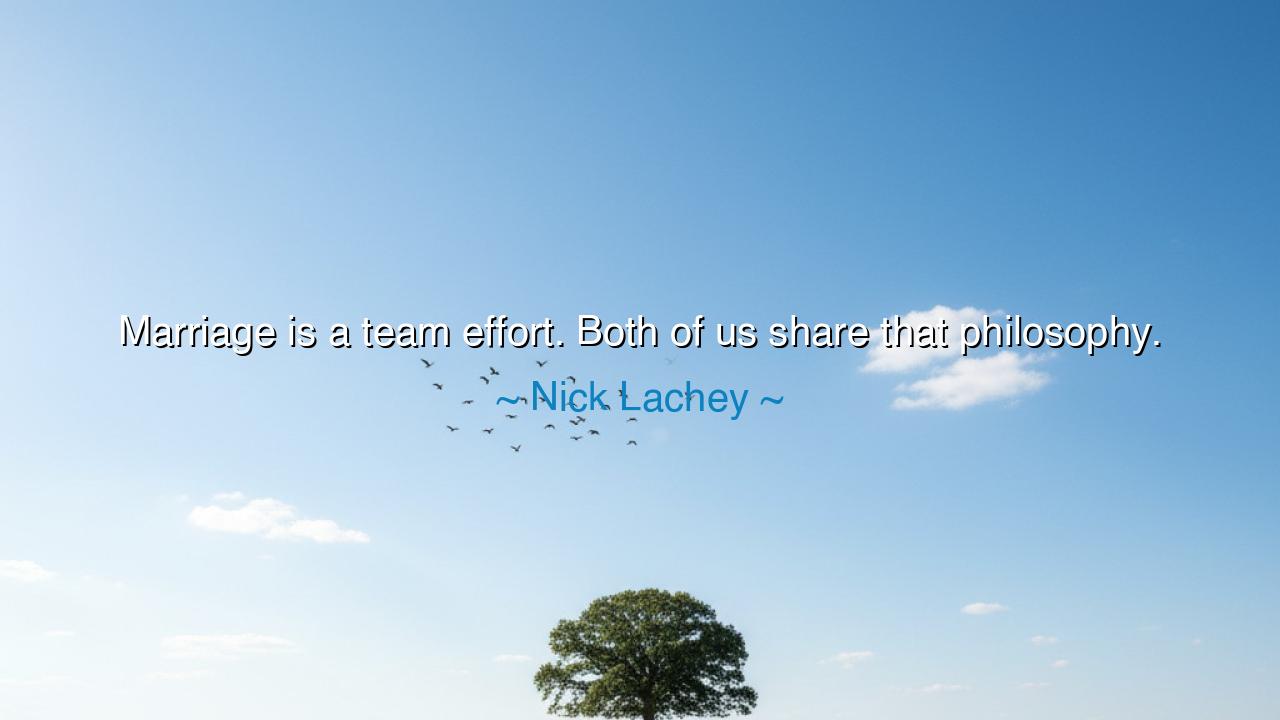
Marriage is a team effort. Both of us share that philosophy.






"Marriage is a team effort. Both of us share that philosophy." These words, spoken by Nick Lachey, capture the profound essence of what marriage is meant to be—a partnership where both individuals work together toward a common goal, supporting each other, sharing responsibilities, and making sacrifices for the well-being of the relationship. To see marriage as a team effort is to understand that it is not a union where one dominates, but one where both contribute equally, combining their strengths and compensating for each other’s weaknesses. It is a powerful reminder that in marriage, as in life, the sum of the whole is greater than the individual parts.
In the ancient world, the union of two individuals was often viewed through the lens of duty and societal stability. In Rome, marriage was seen as the foundation upon which families and, by extension, the empire itself, were built. The philosopher Aristotle spoke of the role of the husband and wife, each bringing their own virtues to the marriage, ensuring the harmony of the household. Women were often tasked with managing the home, while men provided for and protected the family. But Aristotle, in his discussions on ethics, also recognized the importance of balance, emphasizing that a virtuous marriage—like any relationship—required mutual respect, cooperation, and shared responsibility. The ancient notion of marriage as a team effort was rooted in the belief that both parties had distinct yet complementary roles that, when executed together, could lead to a prosperous and stable family.
Consider, too, the example of the great monarchs of history, like Queen Victoria and Prince Albert, whose marriage was one of mutual respect and cooperation. While Queen Victoria wielded considerable political power, it was through the collaborative nature of her marriage with Prince Albert that the monarchy was able to endure and thrive. Albert was not only her consort but a confidant and advisor, contributing to the stability of the British empire. Their marriage is an embodiment of shared philosophy and teamwork, where both partners supported one another in their duties, recognizing the importance of working together for the greater good of their kingdom. In their union, we see that marriage is not simply about the individual desires of the couple but about the collective effort to build something greater than themselves.
In the modern world, Nick Lachey’s view of marriage reflects the evolving idea that a partnership is about equality and shared responsibility. It is no longer enough for one partner to bear the brunt of the burden while the other takes a passive role. Just as a team on the field of battle must rely on each other’s strengths to win, so too must husbands and wives rely on each other to navigate the challenges of life, whether they be emotional, financial, or social. The shared philosophy that Lachey speaks of acknowledges that both partners are essential in making the marriage work and that the success of the relationship depends on the commitment and contribution of both.
The lesson to be drawn from Lachey’s words is both simple and profound: a successful marriage is not about individual triumphs or sacrifices but about cooperation, communication, and shared effort. It is the balance of two individuals, each bringing their own gifts, flaws, and dreams to the table, united in a common cause: the strength and well-being of their union. Marriage is not a contest, nor is it an arrangement where one partner’s needs take precedence over the other’s. It is a team effort, where both must strive to understand, support, and elevate one another.
Consider your own relationships—whether in marriage or in any partnership—and ask yourself: are you truly working together? Are you sharing the responsibilities, not just in the big decisions but also in the small moments that make up the fabric of everyday life? Just as Athletes need teamwork to win, so do couples need collaboration to succeed. If one partner bears the weight of the relationship alone, resentment and exhaustion can build, just as a team will crumble if one player does all the work. It is in the balance—the mutual support and shared goals—that the strength of the relationship is found.
Thus, let us heed the wisdom of Nick Lachey and those who came before him, understanding that marriage, and any partnership, is about working together toward a common purpose. It is about being a team—lifting each other when the other falters, supporting each other’s dreams, and sharing in the work and rewards of life. The true beauty of marriage lies not in grand gestures, but in the quiet effort, day in and day out, to build something stronger, together. And through this, we come to understand that a successful marriage—a union based on love, trust, and mutual effort—is not a destination, but a journey, one that can only thrive through the commitment of both partners working hand in hand.






AAdministratorAdministrator
Welcome, honored guests. Please leave a comment, we will respond soon